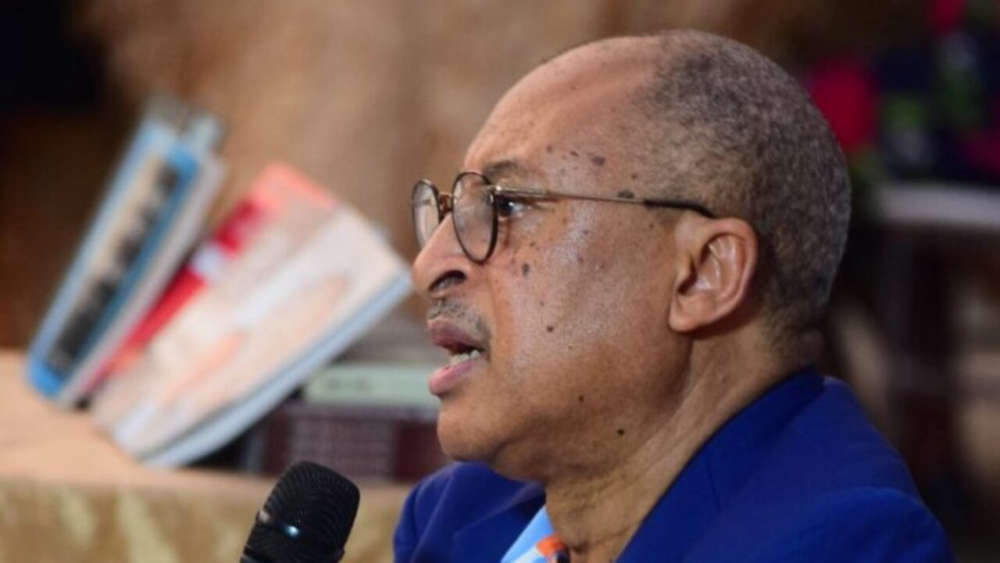
Nigeria Info's Chioma Ezenwafor and Onyekachi Nwosu sat down with renown economist, Pat Utomi in Port Harcourt for a chat about the state of the nation.
NI: Let’s start with what’s going on in Rivers State. You are already familiar with the supposed godfather situation. What’s your take on the lingering political crisis in the state?
Utomi: I think it’s sad. It’s almost mixed, to the point that we don’t have democracy in Nigeria. In a democracy, what matters is the will of the people, but somehow the impression has been created that there is a cabal that captures the state and once state capture takes place, the cabal can try to clone itself in its succession process. As a result of this, some people are giving up on the democratic system and saying, "This is not a democracy; it doesn’t work."
Well, you know that is what happens when that is the general perception. People stop paying attention to the vote and then what, maybe, can happen is that it becomes a survival of the fittest. War between the warlords. So, whoever has the biggest firepower takes over until something happens. And we don’t want to get there; that’s not a good place to be.
Nigeria has suffered much too much from the weaknesses in the democratic system, which started with the fact that political parties are unfortunately not political parties. Who they are in Nigeria is machine politics. People essentially use those platforms to corner power and that’s not good because the position arrived without any clear set of policies that they are going to implement. If there was a proper political party process, then the process of identifying good people who are then socialized into the values of the party into the ideas or ideologies of the party and then become that of identifying party planks, which is then used as the basis for generating policies and implementing them and then held accountable for them. That’s why democracy works. But when the people focus mainly on how to corner power for the godfathers part of this machine arrangement, then it stops being a democracy and the people are worst for it because all the resources go into oiling that machinery and the state resources.
Can these politicians justify the amount of public money that is being spent on these games that they play? I think that part of it is the failure of civil society because if civil society were alive and awake, politicians would be called to account for these things. They cannot continue to carry on like that. Look, many years ago, I was part of a big campaign for what became the International Criminal Court. I remember that in January of 1997, I made a presentation to the editorial board of the Christian Science Monitor in Boston. At that time, it was one of the greatest newspapers in the world from my days. I was fortunate as a grad student back in the 70s to be a contributor to the CSM and so when I returned on sabbatical, I was writing a book about business school in 1996, 1997, I began this campaign traveling around the U.S. and said we should try African leaders who literally essentially betray their people through genocide and economic crimes that come through corruption. In January of 1997, I was then asked by the general board of the Christian Science Monitor to come in and talk to them about it. So when I finished my presentation, they said it would never happen that this international criminal court thing you are being too idealistic. Two years later, it happened. I didn’t get my two courts. I wanted two courts. I wanted a court to try leaders for economic crimes against their people and if we did that, half of the governors in Nigeria would be jailed. That's why it's an even more important court than the criminal court that looks at genocide and stuff like that. We need international economic crimes courts against leaders who used the commonwealth in the state capture syndrome that has come to Africa. In the last couple of years, I have served on the boards of some South African companies. And the good portion of their board meeting time, they spend dealing with this state capture. South Africa set up its own commission to deal with its state capture. Here we are and since we started this conversation, I kind of laugh at them. I said, look, we are talking about state capture; you have not seen state capture. In Nigeria, you see state uplift; they carry the state, not capture; we carry it. We must stop this. If we don’t stop it in Nigeria, we are lost; we are done.
NI: Okay, now what do you say to the people who find themselves in a state where these godfather situations are playing out?
Utomi: Again, this is the point that I made about civil society. It is important for civil society to organize themselves and say, “Enough is enough; we cannot continue like this." Unfortunately, civil society has become so weak. When we were in school at the University of Nigeria in the early 1970s, before you start, we were already on the streets. What has happened? Why are students not able to respond? Why are professional groups not able to organize effectively? So, this is really a problem that we are facing in Nigeria and we really cannot, as a society, afford for civil society to be tamed docile.
NI: Now let’s go to the economy. Much has happened since the inauguration of the current administration. What do you make of the efforts so far to revive the economy?
Utomi: Well, seeing is believing, as they say, so we have to watch, wait, and see. I’m just worried because the government has a major legitimacy problem. It spends most of its time reacting to the fact that it lacks legitimacy. And so policies are not necessarily inspired by a clear goal but rather by, “Is France going to see this? and say, ‘Okay, good, good boys’, ‘Is Washington going to see this? Oh, okay, yes, we would support you.’” They are distracted by this lack of legitimacy and that’s unfortunate for the Nigerian economy.
NI: What is your view about former president Olusegun Obasanjo’s comment that Western liberal democracy is not working in Nigeria and other African countries?
Utomi: Describing Nigeria as a democracy, I mean this is not a democracy, this is brigandage. When I looked at what happened in the states that held off-season elections last week, it just seemed like a very rude joke, I mean let’s take a look at Imo state as an example; no presidential election has generated as much passion as the 2023 election, I can’t think of any since democracy, since this republic, since 1999, no presidential election has generated passion like the last one did, and with all of that passion, 400 and something thousand people I’m told went to the polls to vote in the presidential election in Imo state and then a few months when people are giving up on democracy, and decided to forget that democracy works in Nigeria, 500 and something thousand would come out to vote gubernatorial election. Come on, it doesn’t make any sense, it doesn’t add up the maths, it's bad, even my poor arithmetic does better than that, so something is wrong.
And what Nigerian politicians need to understand is that the more they do these things, the more they create these legitimacy crises, and the more they set us on the road to Somalia, that’s how Somalia got to where it is, once people started believing that there was no point in the system, they just decided there’s no rule of law, it doesn’t work, let’s take the law into our hands, after a while what you have is warlords all over the place and I think that we are in grief danger of that happening, if politicians don’t rethink and think about how we can have a reset.
NI: Alright, some people believe that INEC performed worse in the last off-cycle elections. some people say, ‘Look they did a bit better’, what's your assessment of the commission’s performance in the last two elections?
Utomi: I will be very honest, I paid no attention to this thing, as far as I was concerned the process was already a joke, so I didn’t pay any attention, I just picked up this thing about the number of people who voted in Imo state, I didn’t pay any attention to the election, I wasn’t even in the country so I can’t in good conscience evaluate the off-cycle elections
NI: Would you subscribe to the views of those who say we give too much attention to the court, the courts know and decide who becomes governor. For instance, in Plateau state, the governor has been asked to leave, and he’s gone on appeal, and in a few other states too. Some people are saying too few two people are deciding who governs millions of Nigerians.
Utomi: You know the most painful thing about all of these things is that we spend billions of naira trying to organize elections, and in the end, it comes down to a few cliques, either they are in the court or wherever deciding, ‘Okay, I prefer this person to that person’. So why don't we stop wasting that money and use the money to help build an economy? Build the poor and the maybe (Laughter) will organize a boxing match if you can knock down that guy, you become a governor, because it’s pointless wasting that money when you know that the voting has no bearing on who ends up as a governor or whatever position, so let’s have a boxing match you or wrestling match or whatever that we find more entertaining, then let the winner be the person we chose. You know, in America back in the 60s when these things were going around they had a fairly more civilized way of having coup d'etat, you know, let’s say this General wants to carry out a coup, that General wants to carry out a coup, they will say, ‘Okay, how many divisions are loyal to you?’ This one says six divisions, that one says three, they will say, ‘My friend, remove the presidential search and give the man who has six divisions’. It’s like a joke, but that’s what we’ve come down to. Very few people take the electoral process in Nigeria seriously. So, the system here is not working.


